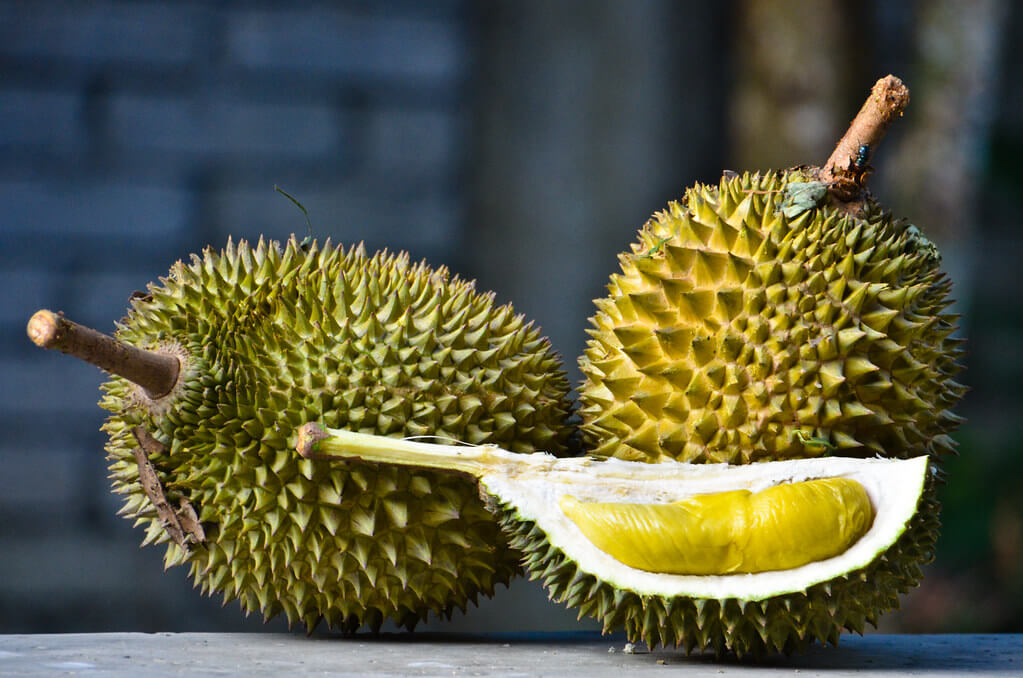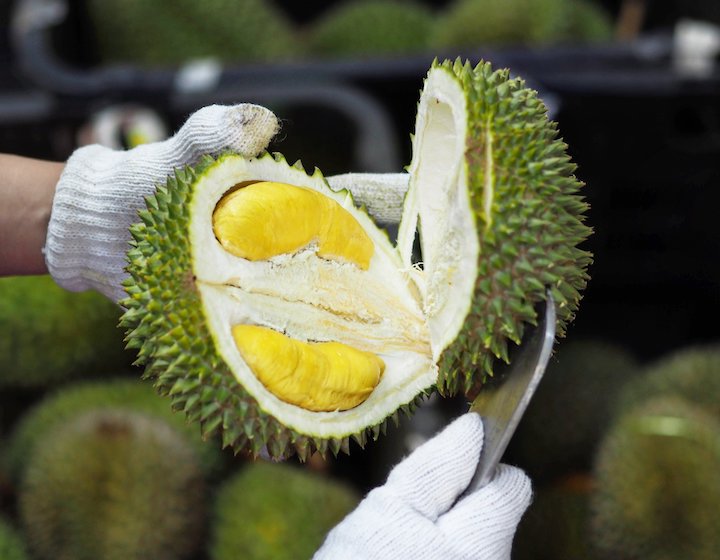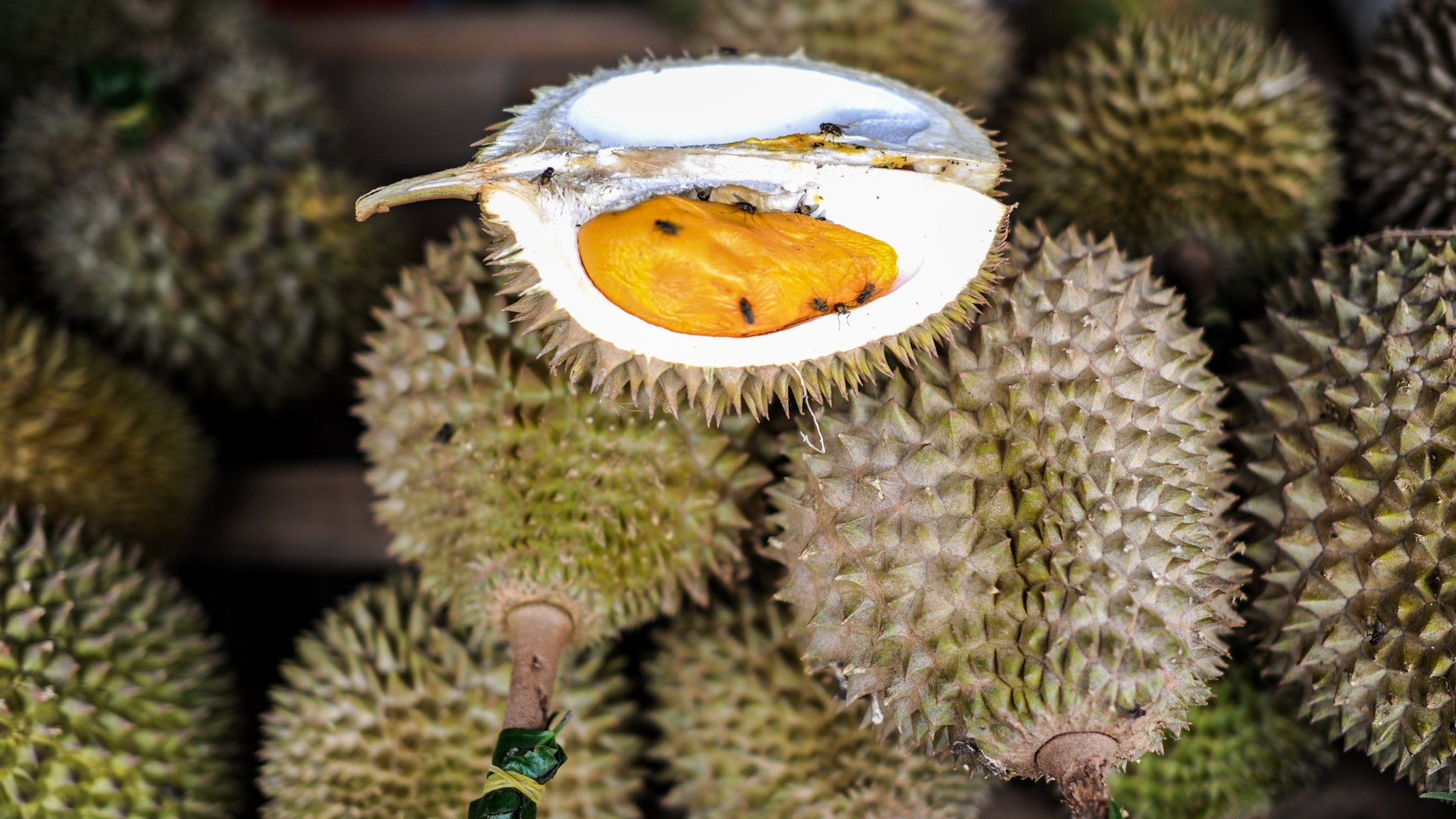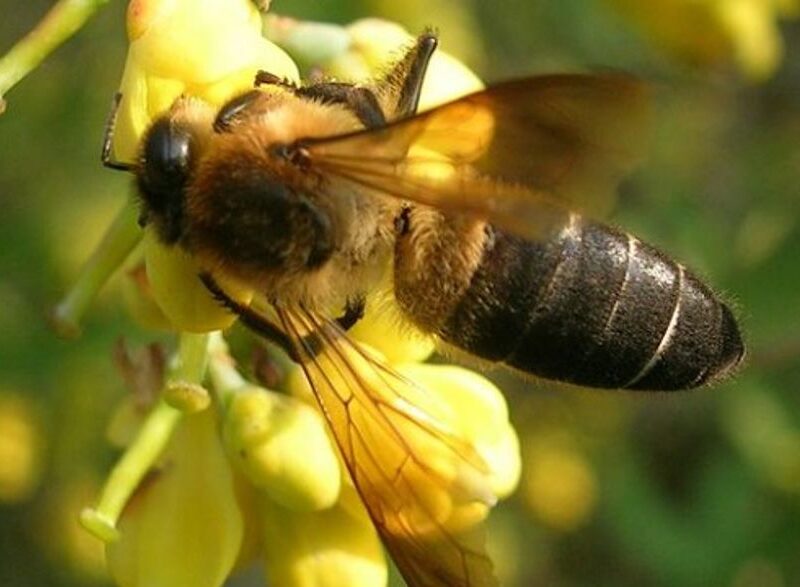No, durian is not illegal in Singapore, but there are regulations in place to manage its distinctive odor. The country, known for its cleanliness and efficiency, has implemented restrictions on the possession and transportation of durians in public spaces like buses and trains. These measures aim to prevent the fruit’s strong smell from inconveniencing commuters.
Despite these limitations, durian remains a beloved and culturally significant fruit in Singapore. It is readily available for purchase and consumption, especially during the annual durian season, which typically runs from June to August. During this time, various durian varieties can be found in local markets and enjoyed by both locals and tourists.
What Makes Durian So Divisive?

Durian, often referred to as the “king of fruits,” is a unique tropical delight that elicits strong reactions from those who encounter it. This thorny, greenish-brown fruit is celebrated for its rich, custard-like texture and complex flavors, often described as a mix of sweet, savory, and creamy.
However, durian is equally infamous for its polarizing feature: an overpowering odor that can be intensely pungent and offensive to some, leading to its ban in certain public spaces in countries like Singapore and Thailand.
The Durian Experience
For those who dare to try durian, the experience can be a culinary adventure like no other. Its rich and creamy flesh offers a burst of flavors, ranging from sweet, caramel-like notes to hints of almonds and even onions. Durian enthusiasts praise its unique taste, often comparing it to indulgent desserts.
The Aroma: Love It or Hate It
While the taste of durian has many fans, the fruit’s aroma is where opinions diverge dramatically. The scent is so potent that it has been described as a combination of rotten onions, gym socks, and turpentine. This strong smell is a major turn-off for some, leading to a vehement dislike for durian.
Durian: A Cultural Icon
Durian holds a special place in the hearts of many Southeast Asian countries, where it is considered a cultural icon and a symbol of national pride. It features prominently in local cuisines, and durian-related products are in high demand, from durian-flavored candies to durian coffee.
The Durian Ban
Despite its popularity, the durian’s pungent aroma has led to restrictions in several countries. In Singapore, for example, the fruit is banned in public transportation and enclosed public spaces to prevent the discomfort it may cause to others. Similar bans are in place in Thailand, where some hotels and public transportation systems prohibit durian.
When Is the Best Time to Enjoy Durian Fruit?
Durian, often referred to as the “king of fruits,” is a seasonal delight that reaches its peak of perfection during specific times of the year.
Durian Season: A Culinary Celebration
Durian has a distinct seasonality, and the best time to enjoy it is during its annual harvest period, typically spanning from June to August in many Southeast Asian countries, including Thailand, Malaysia, and Indonesia. During this time, the fruit markets come alive with a diverse array of durian varieties, each offering a unique taste and aroma.
The Durian Varieties: A World of Flavors
One of the joys of durian season is the opportunity to explore a wide selection of durian varieties, each with its own distinct characteristics. Popular varieties like Mao Shan Wang, D24, and Red Prawn offer a range of flavor profiles, from sweet and custardy to complex and savory. Different durian cultivars ripen at slightly different times during the season, allowing enthusiasts to savor a variety of taste experiences.
The Durian Festivals: A Cultural Extravaganza
Durian season is not just a gastronomic event; it’s a cultural celebration. Many regions in Southeast Asia host durian festivals and events during this time, paying homage to the fruit’s significance in their culinary heritage. These gatherings often feature durian tastings, competitions to determine the best-tasting fruit, and even durian-themed merchandise.
Making the Most of Durian Season: Tips for Enthusiasts
- To experience the full spectrum of durian varieties, head to local fruit markets during the season. Vendors often offer tastings so you can select the one that suits your palate.
- Consider joining a guided durian tasting tour. Experts can introduce you to different durian varieties, help you understand the nuances of flavor, and offer tips on selecting the perfect durian.
- Indulge in moderation, as durian can be rich and filling. Sharing the experience with friends and family can enhance enjoyment and create lasting memories.
What Are The Varieties Of Durian In Singapore
Singapore is a durian lover’s paradise, offering a delightful range of durian varieties to tantalize taste buds. Here are some of the most sought-after durian varieties you can find in the Lion City
Mao Shan Wang (Musang King): Arguably the king of durians, Mao Shan Wang is renowned for its rich, buttery texture and a flavor profile that combines sweet, bitter, and nutty notes. Its custard-like consistency and intense aroma make it a top choice for many durian enthusiasts.
D24: Known for its sweet and creamy taste, the D24 durian is a favorite among locals and tourists alike. Its pale yellow flesh is smooth, and it offers a balanced blend of sweetness with a slight bitter undertone.
XO: The XO durian is celebrated for its strong and complex flavor. It’s often considered the connoisseur’s choice, with a taste that includes hints of brandy, almond, and a mild bitterness. This variety is highly sought after for its depth of flavor.
Black Thorn: Black Thorn durians are prized for their sweet and creamy flesh, which has a distinct bittersweet taste. They are smaller in size compared to other durians, but their flavor more than makes up for it.
Golden Phoenix (Jin Feng): Golden Phoenix durians are known for their bright yellow flesh and a flavor that leans toward the sweet side. They have a mild aroma and are appreciated for their smooth and creamy texture.
Red Prawn (Hong Xia): Red Prawn durians are characterized by their reddish-orange flesh and a sweet, slightly gummy texture. They offer a delightful balance of sweetness and a mild bitter taste.
D13: D13 durians are favored for their sweet and fragrant flesh. They are medium-sized durians with a smooth, custard-like consistency that appeals to those who prefer a sweeter flavor profile.
Green Bamboo: Green Bamboo durians are known for their pale green flesh and a taste that combines sweetness with a subtle bitterness. They are relatively less sweet compared to some other varieties, making them a choice for those who enjoy a more balanced flavor.
These are just a few of the durian varieties you can savor in Singapore. Each variety has its unique characteristics, and durian connoisseurs often enjoy exploring the different flavors and textures offered by these prized fruits. Whether you prefer the rich complexity of Mao Shan Wang or the sweet creaminess of D24, Singapore has a durian variety to suit every palate.
Why Does the Durian Fruit Smell So Terrible?
The durian fruit, often referred to as the “king of fruits,” is known for its exceptional taste but equally infamous for its unpleasant odor. This unique and pungent scent has earned durian the reputation of being the “smelliest fruit in the world.”
The Sulfur Compounds: Culprits Behind the Stench
The primary reason behind durian’s offensive odor is the presence of various sulfur compounds within the fruit. These sulfur compounds, which include hydrogen sulfide, ethanethiol, and methanethiol, are responsible for the foul smell. Interestingly, these same compounds are also found in substances like rotten eggs and skunk spray, which explains the fruit’s unpleasant association.
Ripening Process and Bacteria
As the durian fruit ripens, these sulfur compounds intensify, leading to a stronger odor. The ripening process involves the breakdown of starches into simpler sugars, which are then fermented by bacteria present in the fruit. This fermentation process produces volatile sulfur compounds, amplifying the stench over time.
Individual Perception
Interestingly, the perception of durian’s odor is highly subjective. Some individuals find the smell overpowering and offensive, while others describe it as sweet and fragrant. This subjectivity can be attributed to genetic differences in odor receptors, making some people more sensitive to the sulfur compounds than others.
Evolutionary Theories
There are theories suggesting that the strong odor of durian could serve an evolutionary purpose. Some researchers believe that the scent may deter certain animals from consuming the fruit, allowing it to fall to the ground and naturally disperse its seeds. Additionally, the distinctive odor might attract other animals, like primates, that play a role in dispersing durian seeds.
What Are the Reasons for Keeping the Ban on Durians in Singapore

Singapore, known for its stringent regulations and cleanliness, has maintained a ban on certain durian varieties in various public spaces. While durian is beloved by many, this ban on specific types of durians is rooted in several important reasons aimed at ensuring public well-being and hygiene.
Strong and Pungent Odor
One of the primary reasons for the durian ban in public spaces is the fruit’s powerful and divisive odor. Certain durian varieties emit an aroma that ranges from sweet and fruity to overwhelmingly pungent and foul, often described as reminiscent of gym socks or rotting onions. This odor can linger in enclosed spaces and disrupt the comfort of others, leading to complaints and discomfort.
Maintaining Clean and Pleasant Environments
Singapore places a high emphasis on cleanliness and creating pleasant public spaces for its residents and visitors. Allowing durians in public areas could potentially compromise the cleanliness and comfort of these spaces due to the lingering odor and discarded durian husks, which can be a breeding ground for pests.
Consideration for Allergies and Sensitivities
Durians are known to trigger allergic reactions in some individuals. For those with durian allergies or sensitivities, exposure to the fruit’s aroma or residue can lead to discomfort and health issues. Maintaining the ban helps protect the well-being of those who may be adversely affected by durians.
Respect for Cultural Practices
Singapore is a multicultural society, and it respects the diverse cultural practices and preferences of its residents. While durian is celebrated in many cultures, there is an understanding that the strong odor may not be appreciated universally. Keeping the ban allows for a harmonious coexistence of different cultural practices and preferences.
Preservation of Clean Public Transportation
Public transportation is a vital part of Singapore’s infrastructure. Allowing durians on public transport can pose hygiene challenges, as the fruit’s odor can be difficult to remove from enclosed spaces like buses and trains. Maintaining clean and pleasant public transportation is essential for the convenience and well-being of commuters.
FAQ
Can you open a durian fruit in Singapore?
Yes, you can open a durian fruit in Singapore, but it’s essential to do so in designated areas or private spaces to avoid inconveniencing others with the strong smell.
What country doesn’t allow durian?
Japan is one of the countries that have strict regulations and restrictions on the import and consumption of durian due to its strong odor.
Do Muslims eat durian?
Yes, many Muslims do eat durian. However, it’s important to ensure that the durian is halal, as there are specific guidelines regarding the consumption of halal food in Islam.
Which country eats the most durian?
Thailand is known for consuming the most durian in the world. It is a significant part of Thai cuisine and culture.
Is durian expensive in Singapore?
Durian prices in Singapore can vary depending on the season and the type of durian. Some premium varieties can be quite expensive, while others are more affordable.
How much is 1 kg of durian?
The price of 1 kg of durian can vary widely, but it can range from a few Singapore dollars to significantly higher prices for premium varieties.
Why is durian banned in Malaysia?
Durian is not banned in Malaysia; in fact, Malaysia is one of the world’s largest producers and exporters of durian. However, there may be specific rules and restrictions on bringing durians into certain public spaces.
What country is durian popular?
Durian is popular in several Southeast Asian countries, including Thailand, Malaysia, Indonesia, and Singapore, where it is celebrated as a beloved fruit.
What is the queen of Fruits?
Durian is often referred to as the “queen of fruits” due to its distinctive taste and appearance. However, it’s important to note that this title can vary in different cultures and contexts.
Which country has the cheapest durian?
The price of durian varies from country to country and depends on factors such as the variety and season. Thailand is often considered to have more affordable durians compared to some other countries.
Why do Asians love durian?
Asians have a deep cultural connection with durian, and its unique taste and aroma are an acquired taste for many. It is also considered a delicacy and holds cultural significance in many Asian countries.
Final words
The status of durian is a testament to the city-state’s commitment to cleanliness and consideration for all its residents and visitors. While durian itself is not illegal, there are restrictions and bans in place to maintain a pleasant and harmonious living environment. The strong and divisive odor of certain durian varieties has led to regulations to prevent any discomfort or inconvenience.
These measures, though they may appear restrictive to durian enthusiasts, are in place to ensure that public spaces remain clean, hygienic, and comfortable for everyone. Singapore values its multicultural and diverse community, and these regulations reflect respect for cultural practices and individual sensitivities.
As you explore Singapore’s vibrant culinary scene and enjoy the multitude of flavors it offers, remember that durian can still be savored within designated areas. By sticking to the rules and respecting the shared spaces, you can experience the unique charm of durian while contributing to the collective well-being of this multicultural city.



